Key takeaways:
- The death penalty raises complex moral questions about justice, highlighting societal choices between redemption and retribution.
- Conditions on death row are harsh, often leading to mental health deterioration and a loss of humanity among inmates.
- Advocacy for death row inmates requires emotional resilience and faces societal resistance, emphasizing the need for compassionate justice reform.
- Personal stories of inmates reveal the profound injustices of the death penalty and the importance of recognizing their humanity.
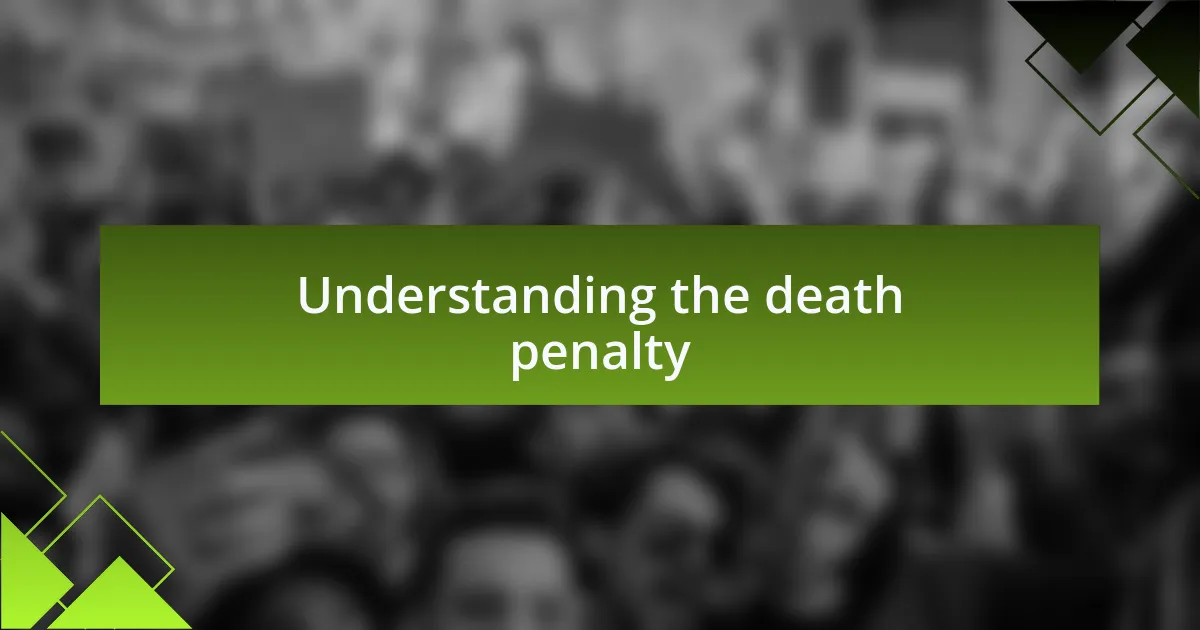
Understanding the death penalty
The death penalty is often seen as the ultimate form of punishment, but understanding its implications goes beyond just the act itself. I recall the first time I encountered the stories of individuals on death row; it was heart-wrenching. Each case isn’t just a statistic—it’s a complex intertwining of lives, circumstances, and, often, mistakes.
Many people assume that the death penalty serves as a deterrent to crime. But have you ever stopped to question whether that belief truly holds water? From my experience, statistics show that states with the death penalty don’t necessarily have lower crime rates compared to those without it. This discrepancy made me reflect on what it means to pursue justice as a society.
Moreover, the debate around the death penalty raises profound moral questions. I often find myself asking, “What kind of society do we want to be? One that seeks redemption and forgiveness or one that leans towards retribution?” These questions highlight just how deeply the death penalty challenges our views on justice and humanity.
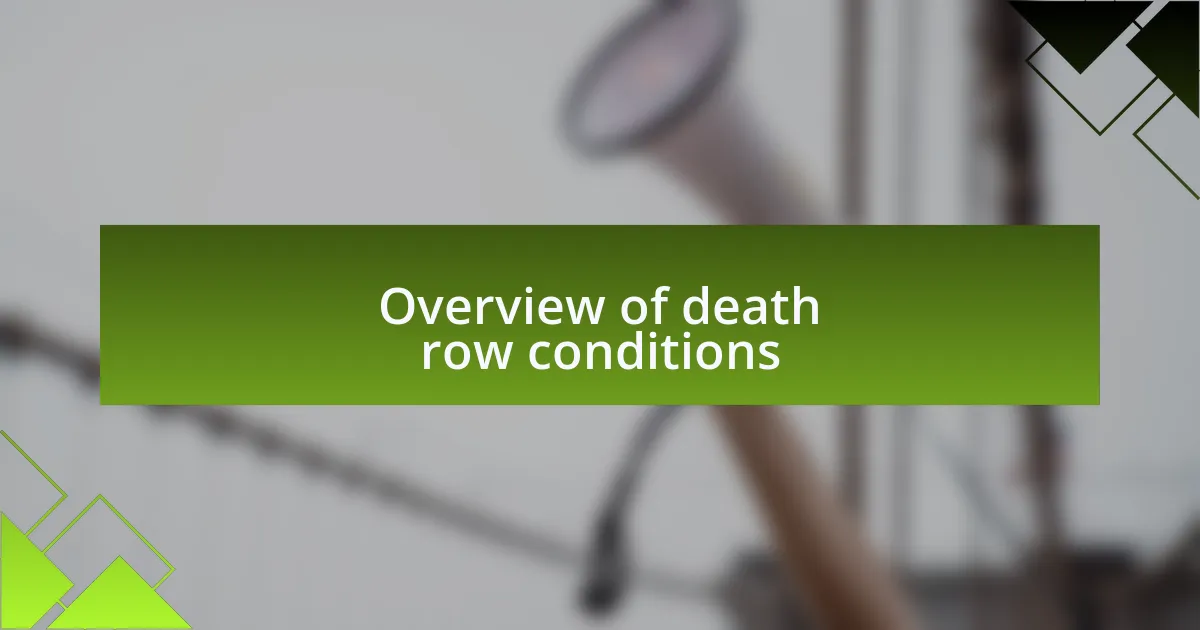
Overview of death row conditions
The conditions on death row can be both isolating and disturbing. Imagine living in a cell the size of a parking space for years, often facing extreme solitude. I’ve read accounts from former inmates who describe their days filled with silence and despair, a scenario that I find profoundly unsettling.
In many facilities, inmates have limited access to sunlight and fresh air, impacting their mental health. I often think about how this confinement strips away their humanity, reducing them to mere numbers. It raises an important question: Can we truly consider anyone deserving of death when they are subjected to such harsh conditions?
Moreover, the lack of proper medical care and the uncertainty surrounding their fates make life on death row even more burdensome. I’ve come across stories of individuals who suffer from physical ailments, yet their pleas for treatment remain unheard. This makes me wonder, what message are we sending when we prioritize punishment over compassion?
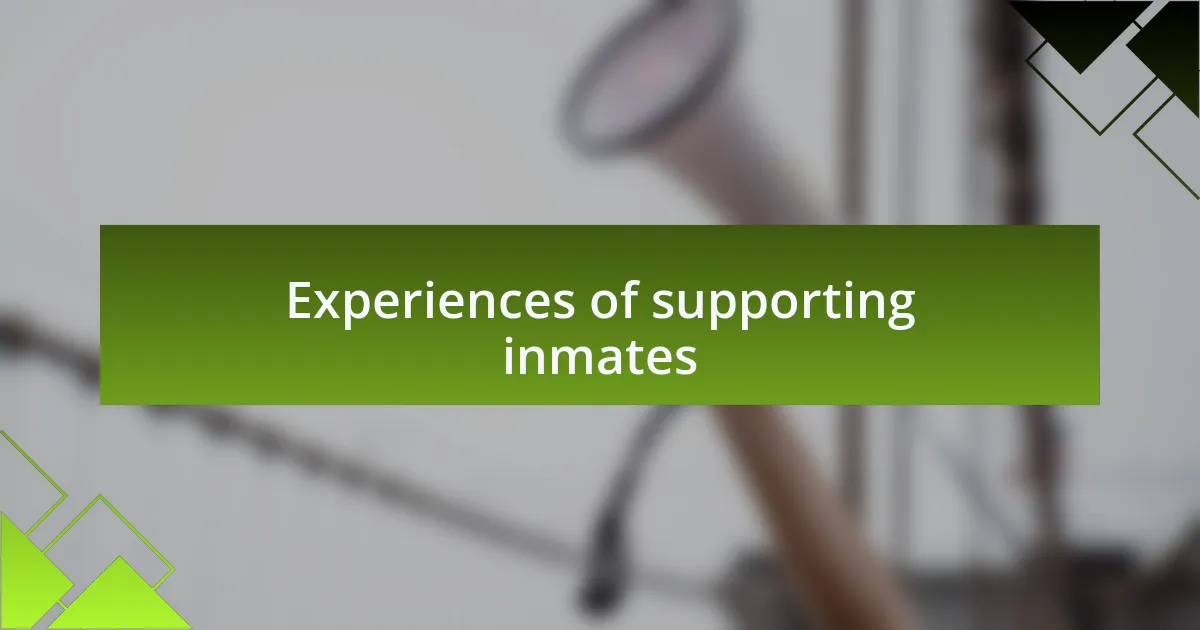
Experiences of supporting inmates
Support for death row inmates often extends beyond formal advocacy; it’s a deeply personal journey. I vividly recall a time when I met with a former inmate during a support group. He shared how a simple letter from someone who believed in him restored a flicker of hope in his life. It struck me then how something as small as a few written words can remind someone they are not entirely forgotten.
I often think about the emotional weight that comes with this work. When I sit across from these inmates, I feel the gravity of their circumstances. It’s a unique connection, and I can sense their vulnerability. I question how society can turn a blind eye to these individuals who are often written off. Each story is a testament to resilience, and it’s heartbreaking to realize that many are simply products of their environment, deserving of understanding and compassion rather than condemnation.
Engaging with these individuals challenges my views perpetually. I remember one night speaking to an inmate who expressed regret for his past but also pointed out that he felt abandoned by a system meant to uphold justice. His pain is a reminder of the larger conversation we must have about rehabilitation versus punishment. How can we genuinely support inmates if we don’t consider their humanity and potential for change? These experiences compel me to advocate for them, seeking a justice system that truly reflects empathy.
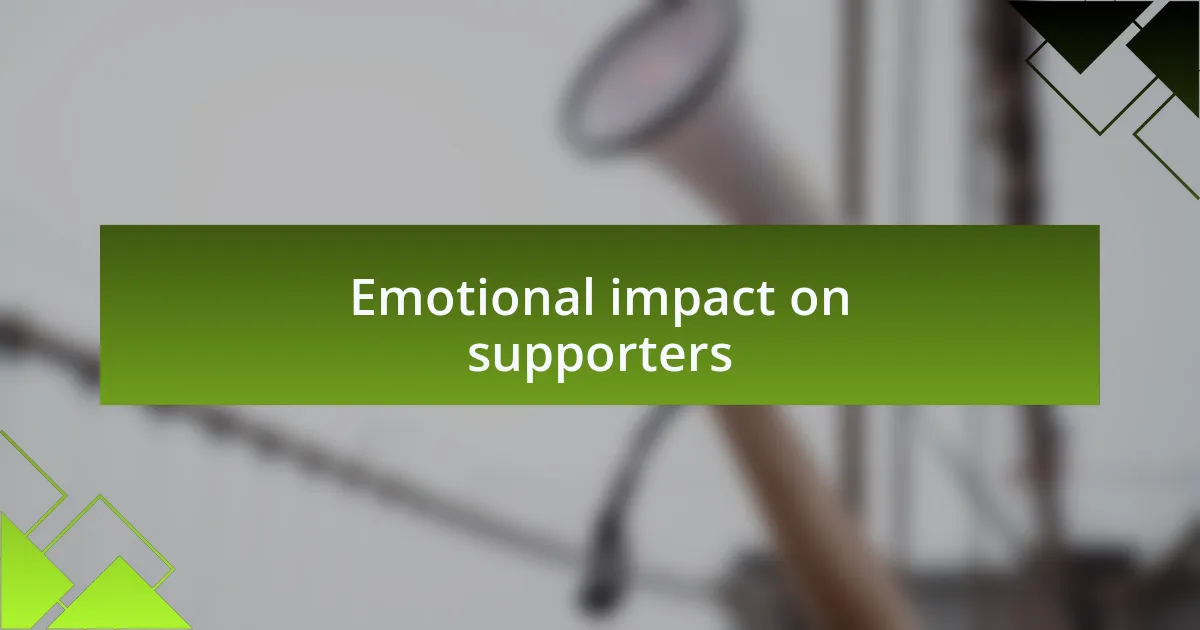
Emotional impact on supporters
The emotional toll of supporting death row inmates can be overwhelming. I remember a particularly challenging moment when I held a vigil outside a prison. The weight of despair hung thick in the air as I listened to stories from family members and supporters. It made me question how we as a society can bear witness to such suffering without igniting change.
Each letter I receive from inmates—full of hopes, dreams, and regrets—deepens my emotional connection with them. One letter, in particular, struck me deeply; the inmate wrote about a childhood memory of his mother reading him bedtime stories. It was a poignant reminder that behind the crime, there is often a person shaped by relentless circumstances. How can we ignore the narratives that define these individuals?
Sometimes, I feel as though my heart is both filled with compassion and weighed down by their struggles. The frustration of watching their stories barely get heard fuels my advocacy. I often find myself asking, how do I convey their humanity to a world that prefers to label them merely as criminals? This emotional conflict drives me to ensure their voices echo beyond the walls of the prison, advocating for a more compassionate approach to justice.
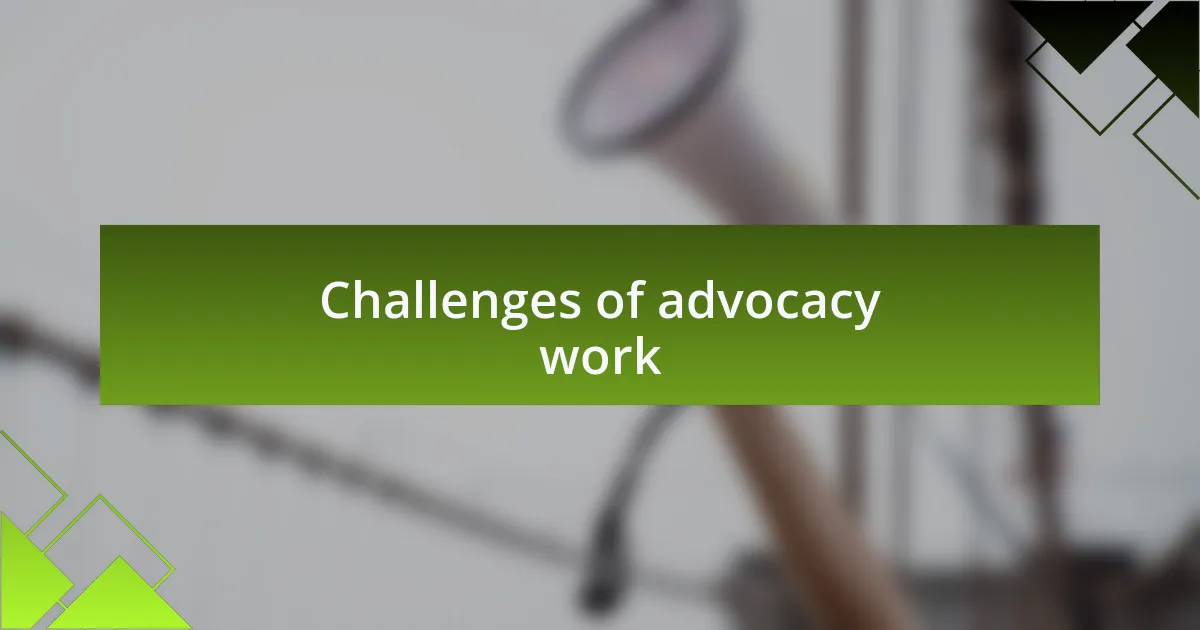
Challenges of advocacy work
Advocacy work can be deeply challenging, particularly when you encounter resistance from various parts of society. I once spoke at a community meeting, passionately sharing stories of death row inmates’ lives and the flaws in our justice system. The dismissive looks I received from some attendees were jarring. It made me realize that changing hearts and minds often feels like an uphill battle, especially when faced with indifference or staunch opposition to the death penalty.
In my experience, engaging with lawmakers can be equally daunting. I remember a meeting where I presented compelling evidence against the death penalty, only to see one legislator dismiss my concerns as mere emotional appeals. It left me with a lingering question: How do we break through that wall of apathy when the urgency of the issue is so clear? The challenge lies not just in providing facts, but in connecting emotionally with decision-makers who may not see the human impact of their policies.
Another hurdle is the sheer physical and emotional exhaustion that comes from continual advocacy. I often find myself juggling multiple responsibilities—organizing events, conducting research, and navigating my personal life. There are days when the weight of these challenges feels overwhelming, leaving me to ask: Is my voice truly making a difference? Yet, it’s these very moments of doubt that fuel my determination to keep pushing for a kinder criminal justice system. The need for change is too great to walk away.
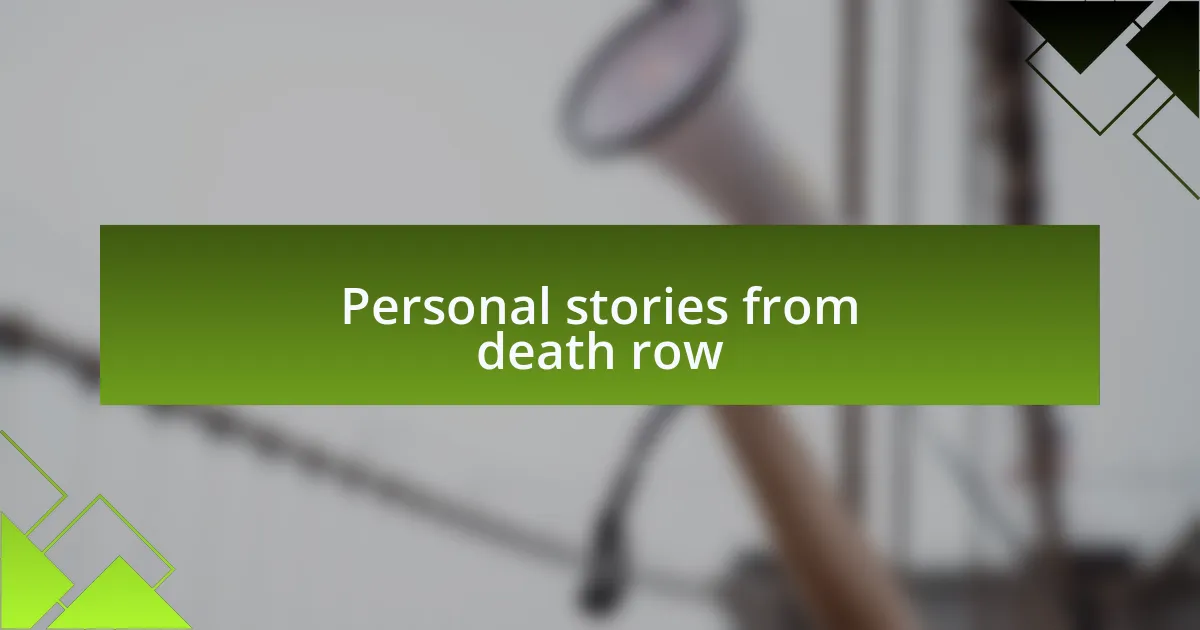
Personal stories from death row
One inmate’s journey truly resonated with me. I remember receiving a heartfelt letter from a man who spent nearly two decades on death row for a crime he didn’t commit. As I read his words, filled with hope and despair in equal measure, I could feel the weight of his longing for freedom and dignity. It struck me how a single story can lay bare the profound injustices hidden behind cold statistics.
Another poignant moment was when I had the chance to visit a death row facility. I met a spirited young man who spoke passionately about his dreams, despite the bleakness of his surroundings. Hearing his laughter and witnessing his resilience was a sobering reminder that each inmate has a life, a past, and a future worth fighting for. How does one reconcile the concept of justice with the stories of individuals who are reduced to mere numbers?
I frequently find myself reflecting on stories that travel beyond prison walls. I often ask, “What would it feel like to be stripped of everything and still hold onto hope?” Engaging with these narratives compels me to advocate fiercely, reminding me that each death row inmate has a unique life that bears witness to our collective humanity. It’s not just about abolishing the death penalty; it’s about recognizing the souls behind the bars.